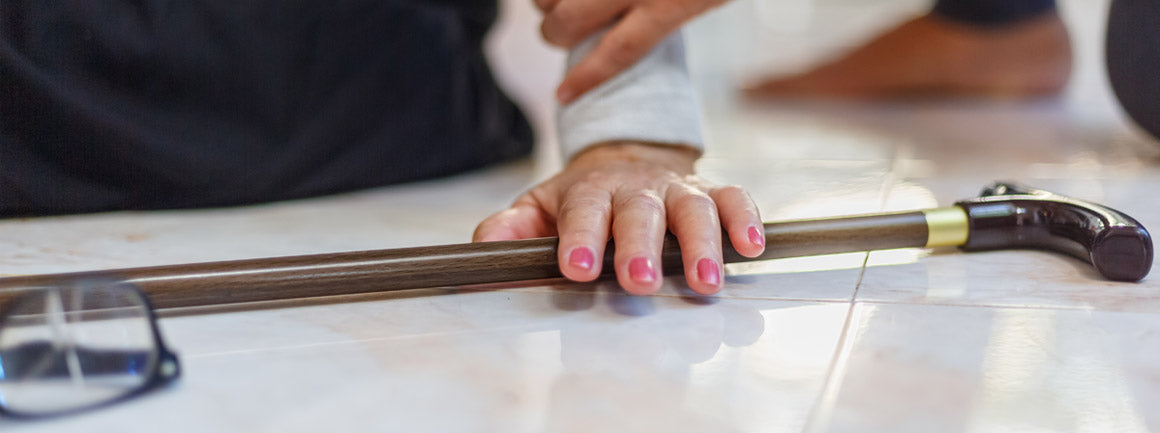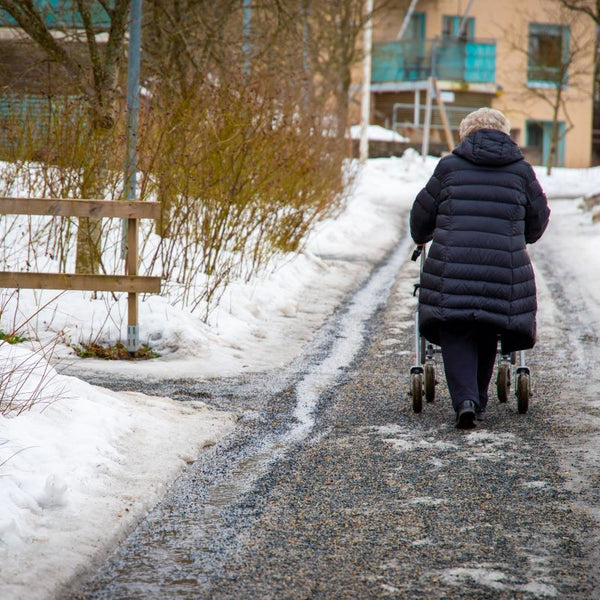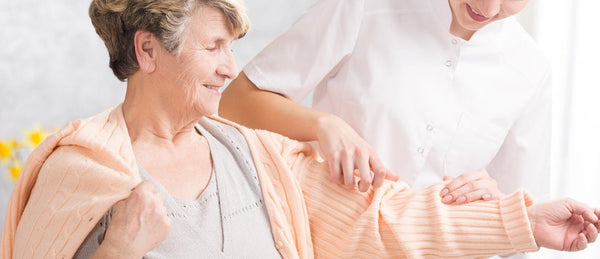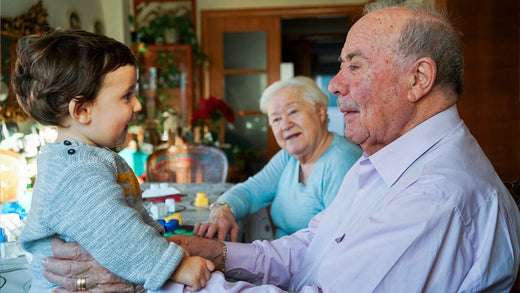Estimated reading time: 4 minutes.
As people get older, their chances of falling over can increase. According to the NHS, around one in three adults over 65 could experience at least one fall a year.[1]
This may be due to the effects of medication, lack of balance, poor vision or long-term health conditions such as low blood pressure and heart disease.
We look at what you can do to help if someone elderly has a fall, how you can help them get up safely if they aren’t injured, what symptoms to look out for after a fall, how to manage fall risks to prevent further incidents and what to do if your elderly loved one is falling down frequently.
In this article, you’ll find information on:
- Steps for helping an elderly person who has fallen down
- Calling an ambulance for an elderly person who has fallen
- How to get someone off the floor who has fallen
- What to do when someone falls down the stairs
- Symptoms to look for after a fall
- Managing fall risks
- What to do when elderly keep falling

Steps for helping an elderly person who has fallen down
If a senior does fall over when you’re present, it’s important to stay calm and encourage them to do the same - panicking isn’t going to help:
- You should wait until the shock has worn off before you try to move them. It’s also important to find out what the cause of the fall might have been.
- You don’t want to cause injury to yourself as well, so check that the area is safe before proceeding.
- If you’re concerned about a potential sprained, fractured or broken leg or foot, or they’re complaining about head, neck or back pain, it may be advisable to leave them where they are and call an ambulance.
- If they lost consciousness when they fell, or hit their head, it could mean they have a head injury and you should call an ambulance.
- You should only move them if you feel confident that it is safe to do so, as you don’t want to make their injuries worse.
Download Fall Prevention Guide
Calling an ambulance for an elderly person who has fallen
If the person who has fallen is in pain and isn’t able to be moved because of injury, you will need to call an ambulance for them. The NHS and ambulance services are under a lot of pressure currently, which means that the waiting time for an ambulance for someone that has had a fall can be longer than perhaps it used to be.
When to call an ambulance for an elderly person after a fall
You should call 999 immediately if any of the following apply:
- The person is unconscious or unresponsive
- There is severe pain or visible injury
- They cannot get up unaided
- There is bleeding that won't stop
- They are on blood-thinning medication
- They are displaying symptoms of a stroke or confusion
- They have other serious medical conditions
Emergency calls for ambulance assistance are categorised and falls resulting in injuries that are not considered to be an urgent threat to life can often mean a longer waiting time before help arrives. It’s important that the ambulance is still called in this kind of situation, with some tips below for assisting the elderly person while waiting for the ambulance crew.
- Keep them warm and dry, with blankets if needed. This is very important if the fall happened outside, especially if at a cooler time of the year
- Give them something to drink to ensure they stay hydrated if the wait for the ambulance is over an hour. If they are lying down and not able to sit up, this may not be possible
- Pain relief such as paracetamol is usually fine to give, but make sure that the ambulance crew are informed of what they have taken and when, as soon as they arrive
If they don’t seem to be injured and are able to be moved, you can follow the tips below to help get them off the floor.
How to get someone off the floor who has fallen
Once you’ve assessed their injuries and determined that the person can be moved safely, you should clear any objects or debris from the surrounding area. For instance, they may have fallen and knocked a glass of water off the table. This should be put well out of the way.
Once they are calm and you’ve determined that there aren’t any major injuries, you should try to help them up into a chair.
How to lift someone who has fallen [2]
- First, you should find two suitable and sturdy chairs. These will be used to help the person up safely.
- Place one chair by their head and the other by their feet. Then, you should help them to get into a kneeling position.
- It’s easiest to do this by encouraging them to bend one of their arms at the elbow and place it on the floor with the palm of their hand face down.
- They will be able to use this arm to push themselves up. Once they’re a little way off the ground, they should use the chair to assist them onto their knees.
- You can help by supporting their hips to ensure they don’t lose their balance or fall back down.
If they complain of anything hurting, you should stop immediately and safely lay them back down.
- Once the older person is in a kneeling position, you should reposition the second chair that’s at their feet so that it’s closer to them.
- When you’re both ready, the senior should lift the leg they feel is strongest and bring it in front of them, putting their foot flat on the floor.
- They should now be on one knee. Ask them to use this leg to stand up. They should do this slowly so they don’t get dizzy.
- You can support them by standing behind them with both arms under their armpits. Once they’re standing up, guide them to the second chair that you repositioned.
If the person fell near a bed or sofa, you can follow the same instructions as above, however you’ll only need one spare chair:
- Once they’re in a chair and you’ve had a chance to further assess their injuries, you should encourage them to see their doctor for a professional assessment.
- You shouldn’t move them if you don’t feel strong enough to do so safely. Instead, try to make sure they’re as comfortable as possible (if the floor is wood or tiled, it may be a good idea to put a rug, towel or blanket underneath them) and call an ambulance.
- Alternatively, if they have a personal alarm or elderly fall alert, you could press it for further assistance.
Download Fall Prevention Guide
What to do when someone falls down the stairs
Falling down the stairs could result in more serious injury than slipping in the bathroom or falling out of bed. If the person isn’t complaining of too much pain, you can use the technique mentioned above to get them into a chair.
However, if you’re unable to move them or don’t want to because they’re complaining of head, neck or back pain, you should call an ambulance immediately.
Advice to help you talk about care options

Talking about elderly care early improves health and wellbeing. That's why we're encouraging family carers to #HaveTheTalk by offering personalised guidance to help you have an open and honest discussion about care options.
Symptoms to look for after a fall
While an elderly person may not seem to be badly injured after a fall and might not need an ambulance or to go to hospital, it’s important to keep a close eye on them for a while afterward, to help ensure they don’t have hidden injuries and to help avoid further falls while they are still recovering.
These symptoms to look for after a fall include:
- Ongoing pain or pain that gets worse in the hours and days after the fall. This may suggest a fracture, deep bruising or soft tissue injury that wasn’t immediately obvious.
- Signs of a head injury – e.g. loss of consciousness, confusion or memory problems, dizziness, difficulty speaking, agitation, severe headache or vomiting. Head injuries can be serious even if the person initially seems fine, especially if they are on blood-thinning medication.
- Any new pain that they didn’t have immediately after the fall. Delayed pain could indicate internal bruising, a slow-bleeding injury, or a hidden fracture.
- Changes in mobility – for example, walking more slowly, unsteadiness, or favouring one side. This may indicate an injury to the hip, knee or back, or it could be a sign that the person is feeling shaken or unwell.
- Changes in mood or behaviour – such as increased confusion, irritability, sleepiness, or withdrawal. These may be subtle signs of a head injury, infection, or emotional distress following the fall.
- Swelling or bruising – especially around joints or the abdomen. While bruises are common, significant swelling or deep discolouration could suggest something more serious like a fracture or internal bleeding.
- Incontinence or changes in toilet habits. Sometimes a fall can be caused by, or lead to, urinary tract infections or other underlying issues.
- Breathlessness, chest pain or palpitations. These could be signs that the fall was caused by a heart-related event or that the person has sustained an injury affecting their breathing or circulation.
If the elderly person doesn’t need go to hospital after their fall, its usually a good idea to get them seen by a medical professional as soon as possible in the days after the fall, preferably their GP.
Managing fall risks
While the prospect of falling can be scary for you as an observer and for your older relative, it shouldn’t be something that frequently weighs on your mind. There are certain fall prevention measures that can be taken to reduce the likelihood of a fall occurring and could stop you from worrying about a parent or grandparent:
- There are also personal alarms that can give you added reassurance should a fall occur.
- These alarms, also sometimes called emergency alarms for elderly, can be worn around the neck or wrist and will alert an emergency team when pressed.
- This means that, if the older person is alone, they can call for help without needing to move. This could stop both you and them from worrying about something happening with no one else around.
- You may also want to consider installing grab bars around their home and making sure surfaces aren’t too slippery.
- Consider walking aids such as walking sticks, rollators and zimmer frames and rise and reclining armchairs.
What to do when elderly keep falling
If your older loved one has repeated falls, despite taking prevention measures like the ones mentioned above, there could be a medical reason why they are continuing to fall, or there might be issues with medications that they are taking that could be a reason for falls. It’s important to get this checked out with their GP to see if anything can be done on that front to help lower their fall risk.
Falls carry a risk of injury and can also have a significant negative impact on confidence and quality of life. If your older loved one is worried about falling, they are much less likely to stay active and mobile, which can actually make them even more likely to fall or suffer from ill health.
Fall prevention is key to your older loved one being able to remain living independently for as long as possible.
It’s important that if an older person does have a fall, they can reach help as quickly as possible. An elderly fall alarm could be a good option as it includes technology that detects a hard fall and raises an alert without the button needing to be pressed.
You can compare features on different products by viewing our full range of personal alarms to find the best fall detection alarm to suit your circumstances.
Life expectancy after fall in elderly
The consequences of falls can be severe. For instance, hip fractures, a common result of falls, are associated with a one-year mortality rate of around 21% even after surgical repair. If left untreated, this rate can escalate to approximately 70% (3). Beyond the immediate risks, falls can lead to long-term complications such as reduced mobility and increased susceptibility to subsequent health issues.
The risk of mortality following a fall is notably higher in individuals over 80 years old. Studies indicate that elderly patients in this age group who suffer fall-related injuries have a 1.48 times higher risk of mortality compared to younger counterparts (4).
These statistics really highlight the importance of fall prevention strategies and prompt medical attention following any fall incident among the elderly.





